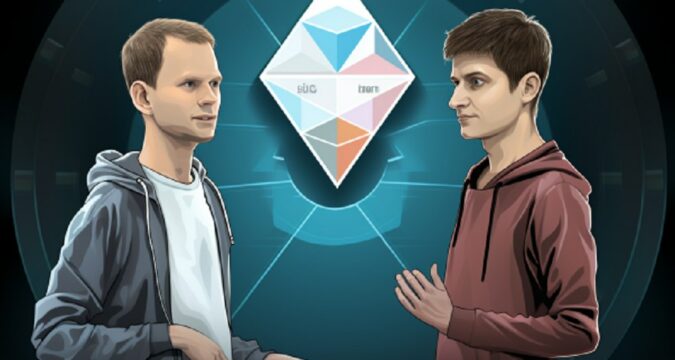
The innovative Worldcoin initiative, spearheaded by Sam Altman, the brain behind OpenAI, has emphasized a relationship between digital identity and artificial intelligence (AI). This project aims to capture the essence of individuality through iris scanning of individuals, resulting in an unparalleled “digital passport” that will redefine the future of identification.
In his contribution to the ongoing discussion, Vitalik Buterin, the co-founder of Ethereum, the world’s second-largest crypto network, highlights several issues with Worldcoin and its potential solutions.
Ethereum’s Co-Founder On Proof Of Personhood
Recently, Vitalik Buterin shared his insights about the revolutionary concept of Worldcoin and its potential to transform online interactions. He suggested implementing a ground-breaking Proof of Personhood (PoP) system to safeguard decentralized platforms like Ethereum, distinguishing genuine human users from deceptive bots.
Buterin added that the importance and application of this cutting-edge PoP system are immense as lives become more connected with the digital realm. According to him, corporations, fraudsters, and malicious bots have turned the virtual landscape into a playground for those looking to exploit and manipulate digital systems for personal gain.
The Ethereum CEO explained that the Proof of Personhood (PoP) system is a formidable defence against deceptive machinations. He added that PoP creates a revolutionary mechanism that grants each individual a unique digital identity.
PoP’s transformative capabilities are broad. For instance, it enables users to erect impenetrable barriers that prevent corporate attempts to dominate digital services.
Meanwhile, Sam Altman, CEO of OpenAI, co-founded Worldcoin. The mission statement of Altman’s new project is audacious; it seeks to capture the irises of every individual on our planet.
Through its remarkable ability to leverage biometric data, the Worldcoin system believes it could distinguish between bots and genuine human users, ushering in a new era of identity verification. The intriguing concept known as “the orb” is the primary objective of this revolutionary system.
Worldcoin entices users to participate in iris scanning with enticing rewards. However, as with any pioneering enterprise, this scheme has risks and complexities, necessitating caution.
Risks And Alternatives To Worldcoin
Buterin raised several concerns about Worldcoin’s ambitious plan. Among them is the orbs – the system’s core device. The Ethereum CEO opined that this feature is susceptible to a significant risk.
According to him, the orbs could become vulnerable to hacking under a decentralized manufacturing approach, allowing unscrupulous manufacturers to generate many counterfeit iris scans. A breach of this magnitude could jeopardize the integrity and security of the entire Worldcoin system.
Another critical challenge for the Worldcoin initiative is the potential exploitation of verified identities. Buterin also expressed concern about individuals selling or leasing their identities, which could lead to unauthorized system use.
The fundamental principle underlying Worldcoin’s cryptocurrency distribution is “one person, one share.” However, if identities are traded or sold, this basic principle is jeopardized, opening the door to a shadowy black market for identity selling and undermining the system’s integrity.
In his analysis, Buterin also emphasized the importance of establishing a robust mechanism to address lost identities within the Worldcoin system. If a person loses access to their Worldcoin identity, it is critical to have a secure and dependable process to facilitate identity recovery.
Without such a plan, the consequences could be severe. It could lead to financial losses and identity theft, creating significant system vulnerabilities.
Hence, Buterin proposes a variety of innovative solutions to address these challenges. Among these potential solutions is establishing “personhood oracles,” specialized communities capable of verifying individuals’ uniqueness.
He also advocates for investigating hardware-backed solutions. Furthermore, Buterin proposes a system where verifying a person’s uniqueness will require consensus from multiple parties.
This multi-party agreement mechanism can reduce the risk of system abuse, paving the way for a more secure and resilient Worldcoin system. While not without drawbacks, the array of alternatives prevents the privacy concerns associated with biometrics.
This crucial distinction leads Buterin to believe these alternatives will eventually outperform the biometric approach.




